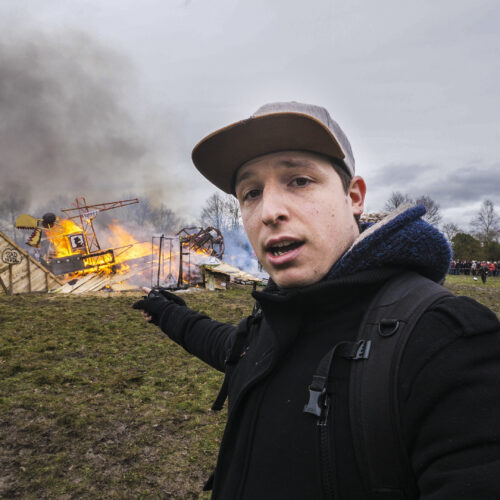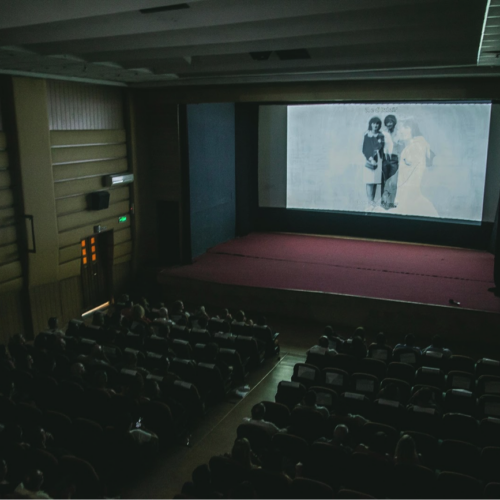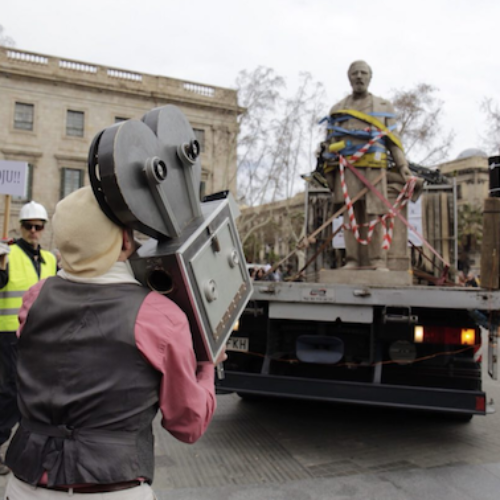traversing the slippery slopes of palestinian solidarity
October 7th was a game-changer for us all. Whether we are new or old to Palestine solidarity activism we have all been trying to make sense of how we can orient our attention, navigate state propaganda and deepen our commitment for the liberation of all people.
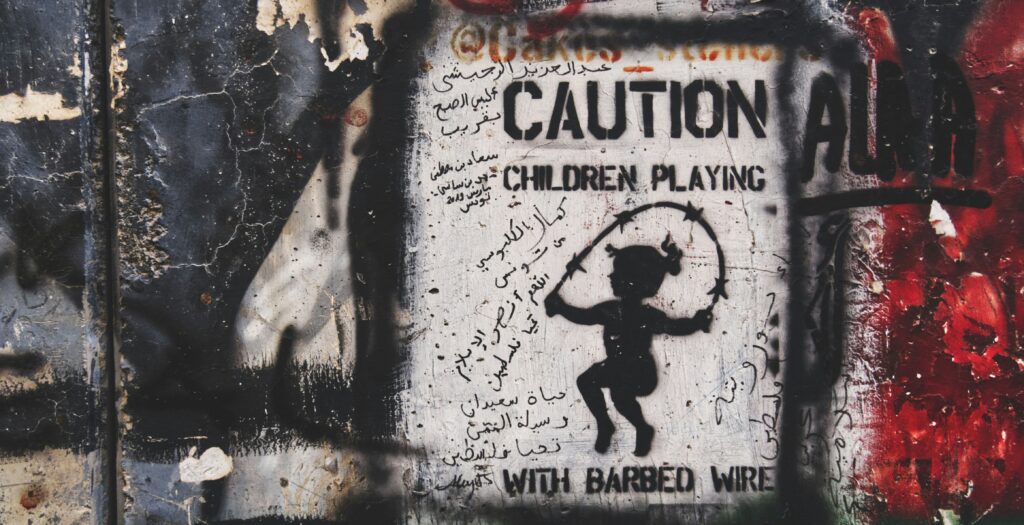
That is why it has been an honour to facilitate two Peer2Peer sessions with the Guerrilla Foundation community. Together we explored:
- How the pro-Palestinian movement can be effective and navigate both antisemitism and islamophobia to lead to a world where Palestinian freedom and Jewish safety are no longer pitted against each other.
- How we can develop skills and insight in challenging the censorship of Palestinian liberation movement building.
- How we can build strategies and skills for effective sustained revolutionary movements and effective mass civil disobedience.
Below I share the roots of this process and some of the key learnings from it.
I was born of a long line of Jews spanning Holland, Poland, Romania and Germany, whereby my grandparents were hunted during the Nazi Holocaust. ‘Never. Again. Ever.’ I heard repeatedly every Holocaust Memorial Day and I became curious as to why some people seek to transform their traumatic experience, and others to perpetuate it. As a child my eyes were forced open to issues of injustice and the banality of evil. The residue this left for me was a critical awareness of the dangers of blind faith in structures that damage society, the dangers of indifference.
So later as an adult I founded ‘Never Again Ever’ – an international network of Holocaust survivors’ grandchildren calling for action over inherited trauma through the dawning realisation that ‘Never Again’ is not as secure as it once seemed.
Since October 7th, I have been taking my film ‘Censoring Palestine – The Weaponisation of Anti-Semitism’ on tour to the heartlands of censorship with screenings to help people break through fear. For example, the Berlin premiere was followed by a highly informative, rich and regenerative discussion with leading activists, scholars and change-makers from the ‘Jewish Bund’ – Berlin based Bundists fighting for social justice, labour rights and Doikayt in the 21st century; ‘The European Legal Support Center’ – an NGO providing free legal support to protect and empower advocates for Palestinian rights in Europe and Doctor Anna-Esther Younes – a scholar of race critical theories, using psychoanalytic approaches and post-/colonial theory.
Whilst I was initially nervous about how the German screenings would evolve, my mind quickly connected the dots from the legacy of colonialism from pre WW2 Germany to the ongoing genocide in Palestine. I was reminded that we really do have all the tools we need to resist – we just need to continually support each other and share resources to pierce through the silencing when people are being murdered. That people fighting for freedom-for-all will not stand for words and phrases being criminalised like ‘genocide’ or ‘from the river to the sea’ which bring clarity to the situation, as Frantz Fanon says “To speak a language is to take on a world, a culture.” Orwellian language censorship seems to always be a single policy change away and it’s then a slippery slope down ever diminishing freedoms of dissent.
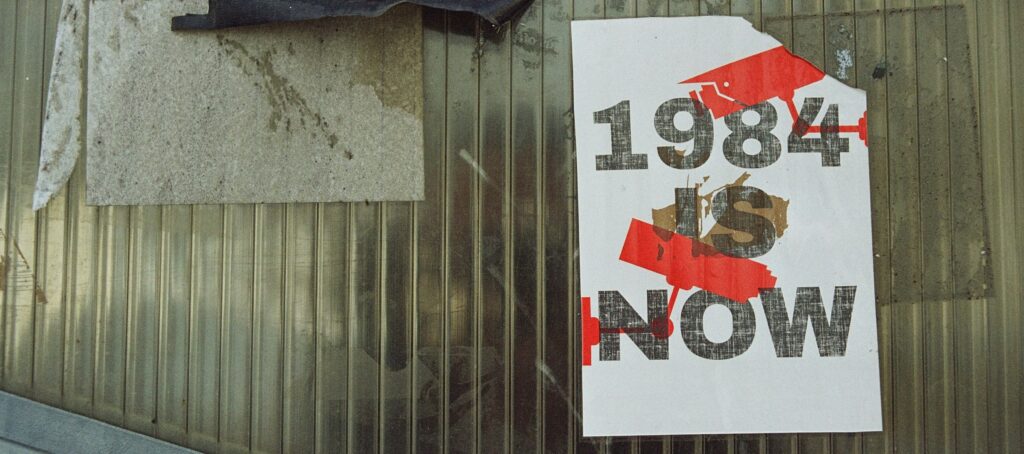
Popular education, dialogue, creativity and action
Today I identify as a ‘pro-Palestinian, anti-pink-washing Jewish Queer LGBT+ and HIV+ activist’ and as an artist and facilitator with ‘In Place of War’ I utilise creativity in places of conflict as a tool for positive change. I am trained as a ‘popular educator’ inspired by the work of educator Paolo Freire, because asking questions of myself and others is one of the most vital acts towards liberation.
So in order to break through cultures of silence we must develop a critical consciousness and an active resilience. Hence we began the Peer2Peer sessions celebrating the Arabic word ‘Sumud’ that means ‘steadfast perseverance’ or ‘resilience with pride’.
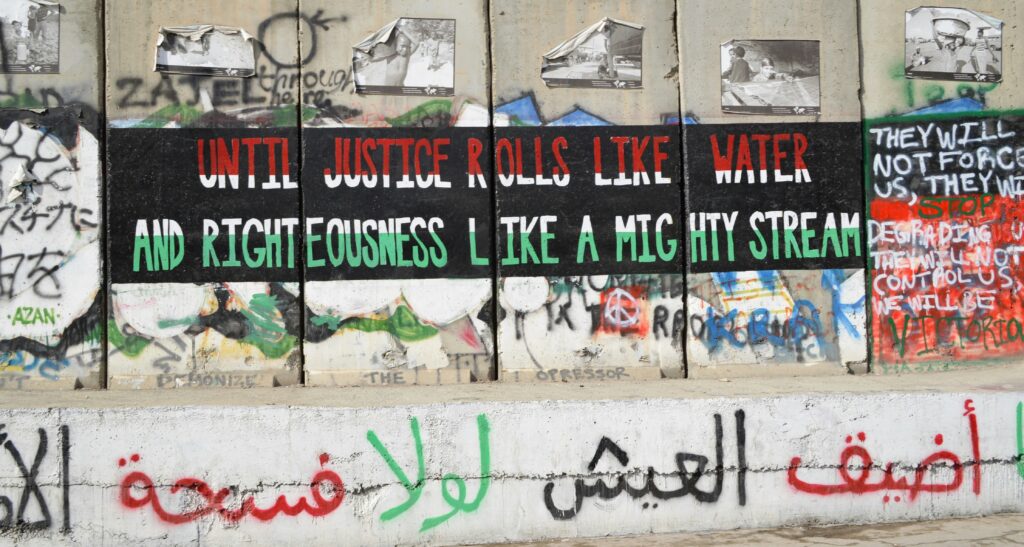
We continued active dialogue in small group discussions that created ‘generative themes’ (themes that generate collective power). Once we harvested these, we were able to overcome our blockages as a community. These were:
- Dealing with loneliness through dialogue, community building and consciousness raising. We all know Palestine liberation has never been about only Palestine but about the wider struggle of power, colonialism and interconnectivity.
- The importance of discussing our fears and how to overcome them. This is only done through speaking out and sharing our experiences. There are many fears which stop our communities from speaking out including being accused of antisemitism, losing jobs, being cancelled, being exposed as uneducated and fearing to change our minds. This is especially poignant in Germany with the witch hunts against anti-zionist Jews, the attempts to require artists to sign the ‘IHRA’ declaration and the new citizenship laws that require pledging allegiance to Israel.
- Accepting our own complicity. That without speaking out, up until now, we may have all been complicit in apartheid. That if we admit that the apartheid and genocide is real and happening then we face the real dangers of imperialist and colonialist conditioning.
- Challenging the ‘politics of confusion’ – where people say ‘it’s very complicated.’ How we must cultivate clarity in our hearts, minds and actions to overthrow zionist conditioning to build empathy for Palestinian freedom. We live in an era both of fake news and deep propaganda via the weaponisation of anti-semistism – it is only through sharing our experiences and tools that we can learn to read the media for bias and structural support of colonialism.
- Balance – The importance of keeping abreast with latest state tactics to censor Palestinian solidarity and to celebrate resistance movements challenging censorship. However we all need to live in balance. Constant doomscrolling through social media can result in overwhelm which leads to inaction. How can we change this into hope and action? Through community based discussion, or holding space, we can combat individualism and alienation from community.
- Deciphering the difference of Sympathy vs. Empathy. How sympathy is often in tandem with the ‘white saviour complex,’ or the mentalities of ‘let’s all hold hands and give peace a chance.’ ‘Fence sitting’ aka “I hate all suffering” denies the structural injustices that result in the Israeli led genocide. Once we are aware of this discussion we can organise in active solidarity – meaning standing in the shoes of the most oppressed and being led by their needs.
- We are living in times of deep grief. What individual and collective forms of grief can we engage with in our communities? How can grief be healing, connective and an alchemical tool for transformation? How leaning into grief can help us deal with overwhelm and cultivate hope for preserving all life with purpose. How this then enables us to step in our powers for constructive anger through community building and targeted activism (vs. destructive anger (blocks/shuts down communication, defensiveness) because ultimately dialogue and education must lead to action such as this brilliant protest over the weekend that many of us were involved in – Palestine activists disrupt Berlin’s European Film Market with protest inside Gropius Bau
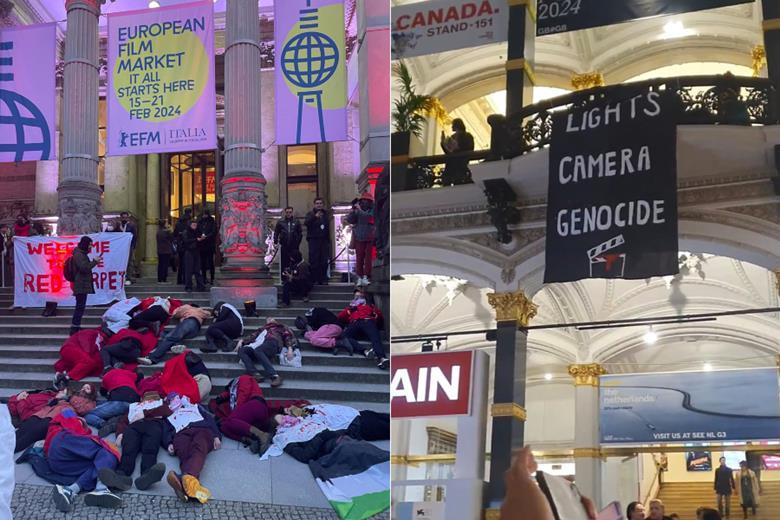
protests outside and inside the gropius-bau at the EFM
Inspiring resources from our sessions
- The ‘Fund Healthcare Not Warfare Coalition’ is now active in Germany, the UK as well as the US.
- The Disruption Network Lab
- Gastivist Resources: – a letter to the climate movement on Israel Palestine
- https://www.gastivists.org/peace-is-fossil-free/
- Patrick, All Hands on: Spiritual practice as it underpins political practice – collaborating with Israeli-Palestinian groups going to Zen Buddhist practice centre in Plum Village France.
- Dan’s Attitude Mag Article and website www.theglassishalffull.co.uk
- Good short piece on remembrance and Germany
- Books: (1) Conflict is not abuse – Sarah Schulman (2) Act Up Emotions – Deborah Gould (3) Paolo Freire’s – The Art of Questioning (4) Angela Davis – Freedom is a constant struggle
About Dan Glass
Dan is an AIDS Coalition to Unleash Power (ACT UP) healthcare and human rights activist, performer, presenter and writer. As an artist and facilitator with the In Place of War global network dan uses creativity in places of conflict as a tool for positive change alongside being an international trainer with Training for Transformation and Beautiful Trouble. He has dedicated his life to anti-racist, LGBTQIA+ and healthcare activism primarily influenced by his Grandparents stories surviving the Nazi Holocaust and the principles of Never Again Ever. He recently founded the self-defence empowerment programme Bender Defenders and Queer Night Pride to confront rising hate crime. All at www.theglassishalffull.co.uk / Follow@danglassmincer and support at https://www.patreon.com/danjglass

